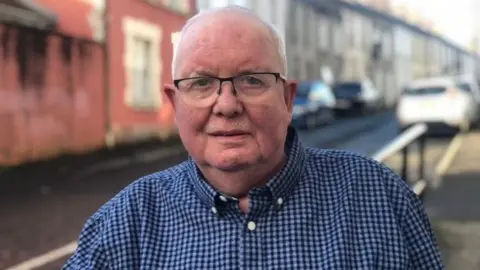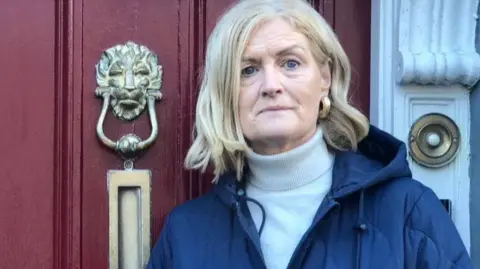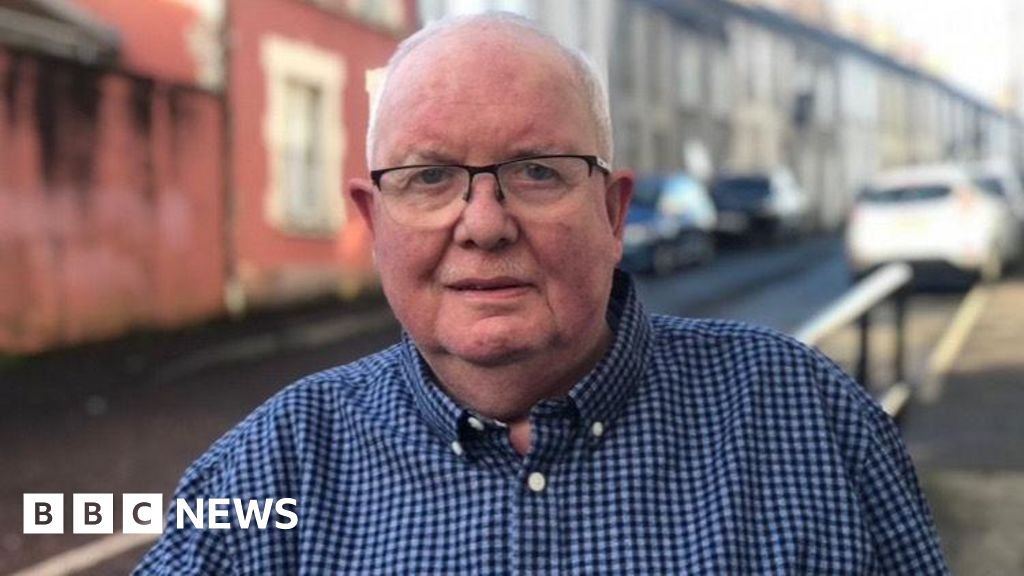 BBC
BBCResidents living near Ulster University’s Magee campus have called on the council to cap the number of houses in multiple occupation (HMO) approved in the area.
This comes after a report exploring the expansion of student numbers at the Londonderry campus was published last year.
The group, Concerned Residents Around Magee (CRAM), said most approved HMOs were concentrated near the campus and were disproportionate with the rest of the city.
A Derry City and Strabane District council spokesperson said new planning policies will put safeguards in place to ensure proposals for HMOs are suitable and appropriate.
The report said the increase to 10,000 students by 2032 would help address regional imbalance and be “transformative” for the region.
However, it noted the quantity of privately rented accommodation and purpose-built student accommodation must be increased.
What are HMOs?
A house in multiple occupation is a property rented out by at least three people who share facilities like the bathroom and kitchen, also referred to as a “house share”.
The tenants must be from more than one household for it be an HMO.
All HMOs must be licensed by their local council unless a temporary exemption notice is in effect.
Belfast City Council’s NIHMO unit administers the regulation of HMOs on behalf of each of Northern Ireland’s 11 councils.

Kathleen Feeney who lives in a terraced street, a five minute walk from the campus, said she feels as if “the street as [she has] known for forty years is disappearing”.
“There are less families here now. More HMOs have sprung up and I feel that the atmosphere has changed,” she said.
“We don’t always know our neighbours; it can be noisy at night and the worst thing is the traffic and congestion.”
“If the houses next door to me became HMOs, I would consider leaving the area, even though it would break my heart,” she said.
According to the HMO licence register, there are currently 212 HMO properties in Derry overall.
Of that total, more than 200 are in the BT48 (Cityside) postcode.
There are seven in the BT47 (Waterside) postcode.
CRAM are calling for an immediate cap of 10% on HMOs in streets neighbouring the university and then a long term cap once the council’s local development plan is adopted.
‘Neighbours are disappearing’
Patrick Gill, a Park Avenue resident for 74 years, feels an oversaturation of HMOs weakens the sense of community.
“Local neighbours are disappearing,” he said.
“Expansion is good for the city but where people are going to live must be considered.”
Mr Gill said people were “worried about the area becoming another Holylands”.
“The HMOs need to be spread out or there won’t be any long-term residents left,” he added.
He also said the number of HMOs led to a lack of parking.
Students’ view

Argyle Street is directly opposite the campus and most homes there are student HMOs.
Leah Coffey, from Fermanagh, and Ciara Fitzpatrick, from County Meath, are final year nursing students and have lived on Argyle Street for the past two years.
Leah said the street’s proximity to the university was an obvious draw for students but highlighted there is a need for more accommodation.
“We had to be so quick in looking and securing a house. If you leave it too late, it gets difficult to find anywhere,” she said.
“I’d say it is hard for residents with some students as it can be noisy.
“But I do think there should be better student facilities although we are in a city and its hard with space too,” she added.
‘Balance and compromise’

A meeting is due to be held for residents on Thursday at the university chaired by Stephen Kelly of the Magee taskforce.
People Before Profit Cllr Shaun Harkin grew up in an area which has seen a rising number of HMOs and said “balance” was needed.
“Residents are not against HMOs or university expansion – they actually welcome it – what they are concerned about is a quick change of the residential character of the area,” he said.
“They don’t want something to develop quickly like the Holylands that would utterly transform it.”
Paddy Gray, professor emeritus of housing at Ulster University, co-authored a report into the Holylands in Belfast.
He said there were accommodation models that worked for both residents and students in other university cities.
Prof Gray said the view of residents are important in finding “an acceptable balance”.
“Students can bring a lot of money into areas too, especially for small businesses,” he added.
‘Sustainable growth’
A council spokesperson said some restrictions have been proposed in terms of the number of rooms permitted in an HMO property and a minimum square feet size of the property.
There are also guidelines around ensuring that HMOs do not impact the character of the local area.
They added that a taskforce, including political representatives and statutory agencies, has also been established, for residents to discuss issues.
At a planning committee meeting on 22 January, members agreed that all applications for HMOs, where they would lead to more than 10% in a street, will be brought to the committee for consideration.
A spokesperson for Ulster University said “student accommodation in the city needs to grow alongside and support the sustainable growth in student numbers”.
The spokesperson said the university worked with its neighbours in North Belfast and will do the same in Derry.




